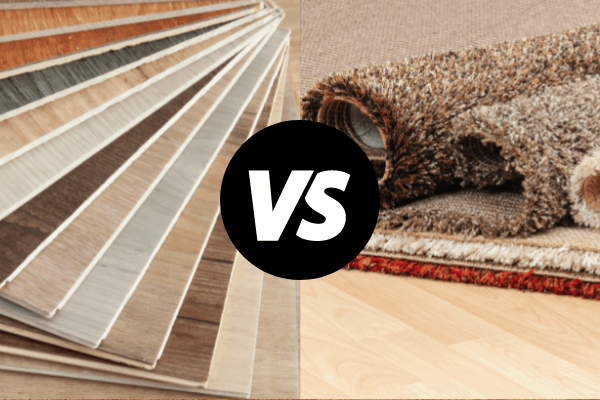Soundproofing is one of the many important factors that people consider when choosing their floors. Given that carpet and Laminate are two of the most popular flooring options out there, it’s essential to understand which of them is better for soundproofing.
Carpets are a better soundproofing option than laminate floors because they can help muffle both impact and airborne sounds. However, with underlayment, Laminate can also be soundproofed enough to be used in homes.
The rest of this article will discuss the benefits of both Laminate and carpet when it comes to soundproofing and will also compare the two flooring options thoroughly, so you can decide which is right for you.

Benefits of Carpets for Soundproofing
Carpets are primarily used to protect the underlying flooring, be it Laminate, vinyl, or hardwood. They’re used everywhere, from offices to schools, restaurants, and hotels.
This is because carpets are an effective way of neutralizing impact sounds.
Impact sounds include sounds like foot traffic, machinery noise vibrating through the floors, moving objects like carts, and so on. They’re very common in high-traffic environments, which makes carpet a popular option in these spaces.
Carpets can reduce airborne sounds like music or loud noises by 35%. Wool carpets are especially effective for facilitating all types of sounds as the wool fibers vary in size and length, allowing them to pick up multiple frequencies. They can also reduce airborne sounds by up to 46%.
For maximum noise-reduction, carpets can be piled together. Alternatively, a thick pad or underlay can be placed below the carpets to help absorb sound. A foam underlay can reduce noise by anywhere from 50% to 70%.
Aside from being effective for soundproofing, carpets also boast a number of other advantages. It’s extremely comfortable to walk on and also helps insulate a space. Furthermore, carpet provides a stable surface to walk on without the worry of the slipperiness that can sometimes accompany hard flooring.
Soundproofing a Carpet
Given the mass it adds to the floor and its sound-absorbing capabilities, carpeting by itself can be helpful for soundproofing. However, adding pads under the carpet will ensure as much sound is absorbed as possible for maximum efficiency.
When selecting a pad, there are two key factors you need to consider:
Thickness
Since adding mass to the floor is the key requirement for noise cancellation, the thickness of the pads you choose will significantly impact the level of soundproofing you will get. While a thicker pad may be more difficult to install and fit to the surface of your floor, it is well worth it for the additional soundproofing it provides.
Soundproofing Ratings
There are soundproofing ratings that can help you decide on a pad to use:
- STC (Sound Transmission Class):
This rating gives you a numbered representation of how effective a certain product is at soundproofing. For maximum results, you should aim for the highest STC-rated product you can find.
- IIC (Impact Insulation Class)
: This is an acoustical rating that tells you the amount of impact absorption that a particular product provides.
Keep in mind that many products don’t have their STC or IIC scores listed on the label. If your preferred carpeting is one of these, you’ll need to consider other attributes, such as thickness and mass, to help you determine how effective it could be for soundproofing.
Drawbacks of Carpeting
Despite its soundproofing benefits, there are also certain drawbacks to carpets you need to keep in mind.
Firstly, carpets are more likely to catch stains and are much harder to clean than other flooring options. To clean the carpet effectively, you need to move everything sitting on it and take out the carpet entirely.
Durability is also a concern. No matter how expensive a carpet is, it’ll always have a shorter lifespan than most other floor types simply because it’s so much easier to damage.
For more information, check out the preferable flooring for home studios.
Benefits of Laminate for Soundproofing
Laminate flooring has been one of the top flooring options for residential use for decades. However, this popularity doesn’t necessarily mean it’s effective for soundproofing.
The truth is, Laminate is not as effective at soundproofing as carpet. However, that doesn’t mean that Laminate is completely ineffective as a soundproofing material.
To make Laminate effective for soundproofing, you’ll need to add a layer of underlayment.
Underlayment is a thin material (usually foam, fiber, rubber, or felt) that is effective for sound absorption. Additionally, it also reduces the effect of wear and tears on your Laminate.
Underlayment is used similarly to the way pads are used with carpets. It’s easily installed and can even be a DIY project for people with skill at home improvement.
Additionally, Laminate boasts a few other benefits that make it a great flooring option.
Check out my article about rubber flooring for use in recording studios.
Affordability
Laminate flooring is a highly affordable option and is usually half the price of wood. It will usually cost about $1-$5 per square foot, making it one of the most inexpensive flooring options out there. Aside from the low up-front cost, Laminate is also very inexpensive to maintain as it is water and scratch-resistant.
Aesthetics
Laminate allows you to create a space that looks both modern and classy. It’s a great choice for people who want the look of genuine hardwood without the accompanying cost.
While most people understandably opt for the wooden effect, though there are numerous other options available. No matter what you choose, the surface of Laminate is very smooth, and you can adjust it to match your interior perfectly.
These reasons make Laminate the top option for most homeowners.
Carpet v/s Laminate
If you’re still wondering which is the better choice between carpet and Laminate, let’s compare the two and see which option wins a head-to-head battle.
Soundproofing Effectiveness
As mentioned above, carpet is definitely a better soundproofing option than Laminate. However, if you’re looking for a flooring option for your home or residential space, Laminate with underlayment should do the job well enough.
Carpet, however, is the better option for busy spaces like classrooms, casinos, hotels, restaurants, and offices.
Winner: Carpet
Price and Durability
When it comes to price, carpets are a much cheaper option up-front. However, that doesn’t necessarily make them more cost-effective.
Carpets are far less durable than laminate flooring, which can last for decades if it’s of good quality. Additionally, they require regular maintenance.
On the other hand, Laminate is very easy to clean and retain its look for a long time. The only thing that can damage Laminate is water, so you’ll have to make sure you use different flooring in areas like the bathroom and kitchen.
Winner: Laminate
Installation Difficulty
Carpet and Laminate are two of the easiest flooring options to install, and you can complete the entire process yourself.
Laminate easily clicks together and doesn’t require any adhesive, which means that all you have to do is lay the flooring and connect it.
Carpets are even easier to install, as all you need to do is cut the carpet to fit the floor and then lay it down.
Winner: Carpet
Clearly, the better flooring option keeping soundproofing in mind is carpet.
Conclusion
Both carpet and Laminate are excellent flooring types with many benefits. However, for soundproofing, carpets are generally a better option. They’re very effective in taming impact sounds, making them ideal for high-traffic spaces.
Laminate can also provide sound suppression, especially when installed with underlayment. However, due to the fact that it’s not as effective as carpet, it’s more commonly used in residential spaces due to the fact that they see less traffic.
Check out whether Vinyl flooring is suitable for recording studios.
Sources
- Bob Vila: 7 Things to Know Before Choosing Laminate Flooring
- QCFlooring: What is the Best Flooring for Soundproofing?
- Snoring Source: How to Soundproof Carpets: Underlayment and More!
- Home Carpet One: Why Carpets are Extremely Effective at Sound Absorption
- Science Direct: Impact Insulation Class
- Science Direct: Sound Transmission Class
- The Spruce: The Seven Benefits of Carpet
Recent Posts
QuickTime is a vital app for many Mac users, and if you’ve recently bought a new microphone, you might wonder how to use it optimally. QuickTime cannot record audio content if it doesn’t have...
Every microphone leaves a unique signature on the quality of its output. If you’re a podcaster trying to melt your way into your audience’s hearts, a muddy, distorted recording won’t cut it....
